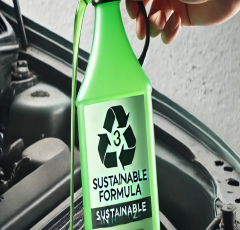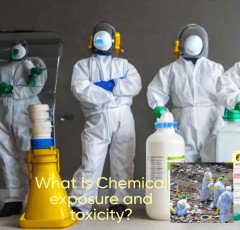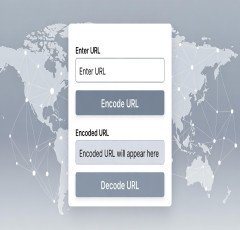
Discover a Sustainable Alternative to Ethylene Glycol for Antifreeze That Saves the Environment and Your Budget

The antifreeze is a critical ingredient in vehicle cooling systems and ensures that the engines function smoothly by regulating temperature extremes. Traditionally, antifreeze relies on ethylene glycol as their primary basic compound. Ethylene glycol, although effective, raises two significant concerns: its toxicity and environmental impact. As an enthusiastic sustainability, I believe it is time to introduce antifreeze again.
Why Ethylene Glycol Is Unsustainable
Ethylene glycol is a long -term component for antifreeze due to its excellent thermal properties. However, its disadvantages for the environment and health are too significant to ignore:
- Toxicity: ethylene glycol is dangerous if ingested, it represents risks for humans, pets and wild animals.
- Environmental Damage: Incorrect disposal of ethylene glycol contaminates soil and water and disrupts ecosystems.
- Sustainability Challenges: As a petrochemical product, its production is strongly based on fossil fuels and contributes to carbon emissions.
Given these challenges, it is not only a possibility to find a sustainable alternative - it is a necessity.
Exploring Sustainable Substitutes for Ethylene Glycol
In order to propose a sustainable and cost effective replacement for ethylene glycol, it is necessary to understand the alternatives available today. Currently, four basic compounds are used in the formulations of antifreeze:
Propylene Glycol
- Pros: Propylene glycol is non -toxic and biodegradable, making it a safer choice for humans, animals and the environment. It is already widely used in foods that speak of its safety profile.
- Cons: It is slightly more expensive than ethylene glycol and may have a marginally higher viscosity that could affect the flow of flow in certain systems.
- Verdict: Propylene glycol is a promising candidate for sustainable antifreeze, especially for applications where safety is paramount.
Glycerin (Glycerol)
- Pros: Glycerin, derived from renewable sources such as vegetable oils, is non -toxic and biodegradable. Its production has a smaller carbon footprint compared to ethylene glycol.
- Cons: Glycerin tends to have lower heat output, which could reduce efficiency in extreme conditions. In addition, its higher viscosity may require adjusting the cooling system.
- Verdict: While glycerin is environmentally friendly, its thermal limitations are better for a slight climate.
Methanol
- Pros: Methanol is cheap and effective in reducing frost points.
- Cons: It is very toxic and volatile, which is unsuitable for environmentally friendly antifreeze. Methanol also evaporates rapidly and reduces its long -term efficiency.
- Verdict: Methanol does not meet the standards of sustainability and is not a viable alternative.
Bio-Based Solutions
- Pros: Emerging biological antifreeze solutions such as corn or other plant raw materials offer significant environmental benefits. They are renewable, biodegradable and have a lower carbon footprint.
- Cons: These solutions are still in the early stages of development and their cost efficiency depends on the savings of the range. Availability can also be limited compared to traditional possibilities.
- Verdict: Bio -based antifreeze has the greatest potential for long -term sustainability, but may require further improvement to effectively meet ASTM specifications.
My Recommendation: Propylene Glycol as the Best Substitute
After evaluating the available options, I believe that propylene glycol will affect the right balance between sustainability, cost efficiency and performance. Here's the reason:
- Safety and Environmental Impact: Propylene glycol is non -toxic and biodegradable, making it significantly safer than ethylene glycol. It reduces the risk of accidental poisoning and environmental contamination.
- Compatibility with ASTM Standards: Propylene glycol -based formulation can meet the ASTM D6210 and ASTM D3306 specifications and ensure reliable performance in vehicle cooling systems.
- Cost-Effectiveness: Although slightly more expensive than ethylene glycol, safety and environmental benefits of propylene glycol, the additional costs, especially when considering long -term sustainability goals.
The Way Toward a Greener Future
Transition to propylene glycol or other sustainable alternatives is not just a step to reducing environmental damage-this is the opportunity to cope with increasing demand for environmental products. Consumers and businesses are increasingly preferred by sustainability and the offer of a greener solution of the antifreeze can build you as a market leader.
To further strengthen the efforts to sustainability, I recommend exploring innovations in biologically based antifreeze solutions. Partnership with scientists or manufacturers specializing in renewable chemicals could prepare a way for breakthrough advances.
The days relying on ethylene glycol for antifreeze are numbered. By accepting propylene glycol or investing in biological alternatives, we can create a product that meets performance standards and at the same time reduces environmental damage.
If you are considering the transition to a sustainable antifreeze, now it is time to act. Together we can manage innovations in this industry and have a lasting impact on our planet.


















 Top Rated From Amazon
Top Rated From Amazon  Best Robotic Vacuum Cleaners
Best Robotic Vacuum Cleaners  Best Home Appliances
Best Home Appliances  RPM 3.0
RPM 3.0  Only For The United States
Only For The United States  Online Marketing
Online Marketing  Sennheiser
Sennheiser  BEST SELLER TOP10
BEST SELLER TOP10  One World Collection
One World Collection  Hot Bags For Pain Relief
Hot Bags For Pain Relief  SEO Checklist
SEO Checklist  ASPINAL LONDON
ASPINAL LONDON  The Secret Email System
The Secret Email System  Best Sellers On Amazon
Best Sellers On Amazon  Women Fashion
Women Fashion  Graphics & Design
Graphics & Design  NordLocker
NordLocker  Hello Theme
Hello Theme  NordPass
NordPass  ASUS Laptop
ASUS Laptop  Favorite Company (Cuelinks)
Favorite Company (Cuelinks)  SOFAS
SOFAS  NordVPN
NordVPN  TitTok Revolution
TitTok Revolution  Amazon Best Selling Products
Amazon Best Selling Products  Unreal Engine 5 For Beginners Learn The Basics Of Virtual Production
Unreal Engine 5 For Beginners Learn The Basics Of Virtual Production  Men Clothing
Men Clothing  1150+Trendy kids coloring pages Bundle
1150+Trendy kids coloring pages Bundle  Best Selling Books
Best Selling Books  ELECTRONIC ACCESSORIES
ELECTRONIC ACCESSORIES  Smart Doorbell
Smart Doorbell  All Wireless Products
All Wireless Products  Unlimited access to classes on illustration, photography, design, film, music
Unlimited access to classes on illustration, photography, design, film, music  Artificial Intelligence
Artificial Intelligence  The Click Engine
The Click Engine  Online Technology Classes
Online Technology Classes  Creative Brief For Video Shoot
Creative Brief For Video Shoot  Acer Laptop
Acer Laptop 
















